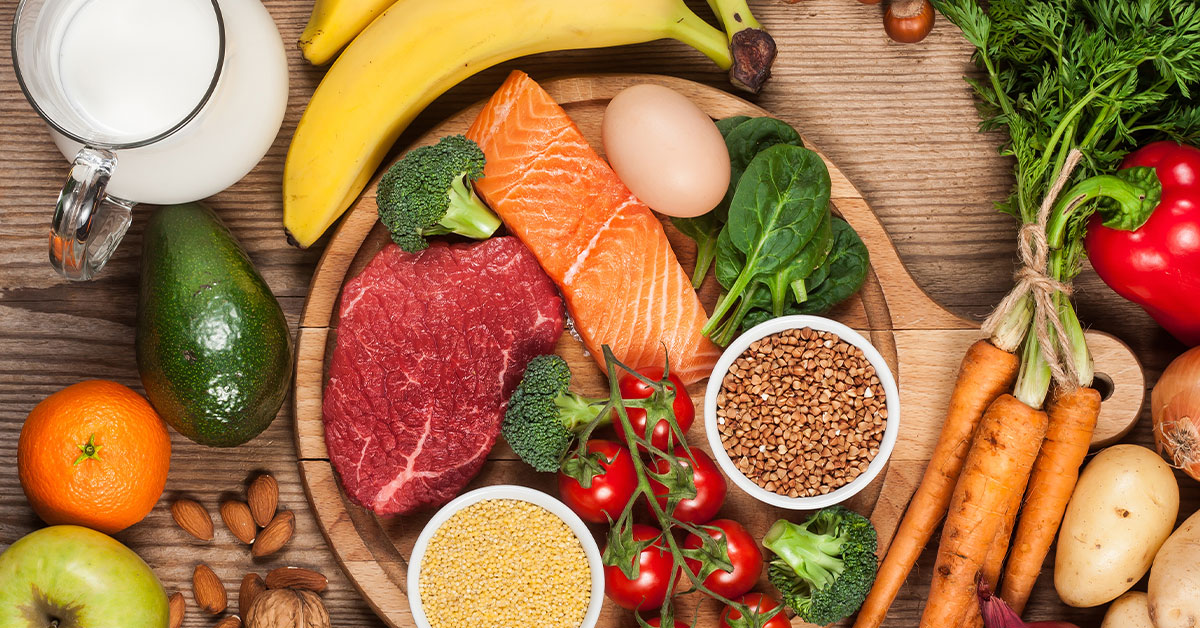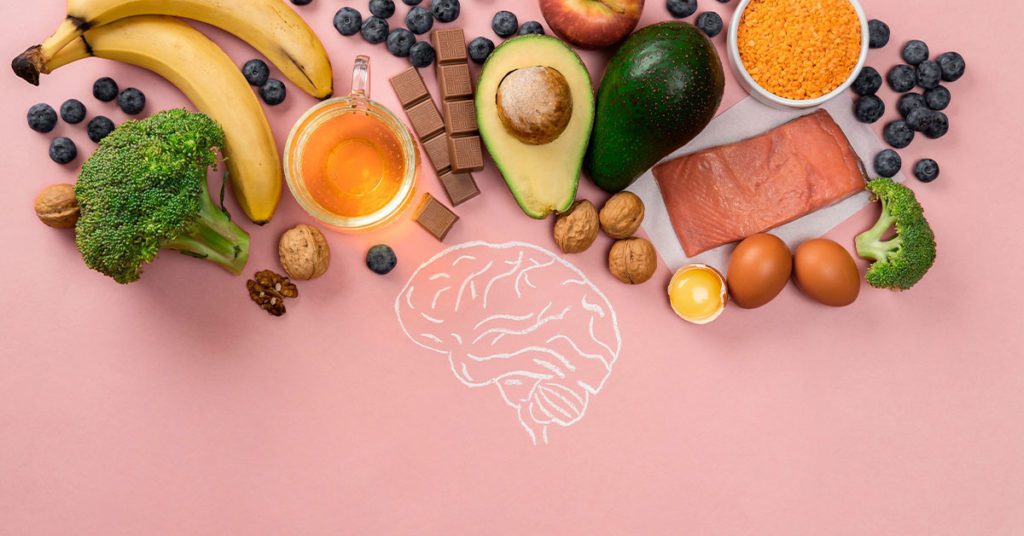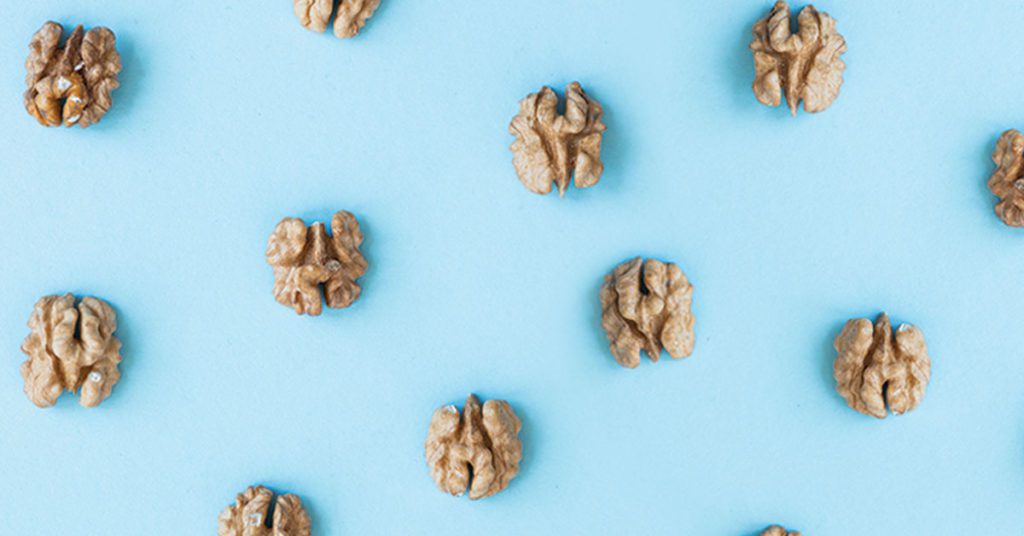Nutrients form the building blocks for a healthy brain. When you know which foods contain nutrients that support brain health, you can create a diet to help focus, learn, and feel balanced. Get inspired with this list of what vitamins and minerals are good for the brain.
7 Brain-Boosting Vitamins and Minerals
Fueling your body with those brain boosting vitamins and minerals not only helps you think, it also impacts emotional health and how you manage stress. Make sure to include these 7 brain-boosting vitamins and minerals to get the nutrients you need to think clearly and feel balanced.
1. Omega-3s
Brain Benefits: Enhance mood, offset depression, reduce risk of Alzheimer’s
Sources: Seaweed, algae, fish (tuna, salmon, herring, sardines), chia seeds
Nerve cells in the brain have an external layer made from fat. It’s a region that facilitates messages sent between each cell, which keeps you thinking. That makes fat sources, like Omega-3s essential fatty acid, a crucial nutrient for brain health. But, most people don’t get enough of it from their diet. You can get omega-3s from supplements or right from the source, by consuming seaweed and algae. It’s also present in fish, thanks to their phytoplankton diet rich in omega-3s from sea vegetables.
2. Phosphatidylserine
Brain Benefits: Enhances mood, improves memory, reduces cognitive decline
Sources: Cabbage, soy, fish, and white beans
Phosphatidylserine is a fatty substance that strengthens the cells in your brain and carries messages between them. It can improve memory, focus, and mood. You can get your source of this nutrient by taking phosphatidylserine supplements or naturally from cabbage, soy, fish, and white beans.

3. Choline
Brain Benefits: Supports memory, mood, and cognitive function
Sources: Meat, fish, egg yolk, dairy
Take it from a brain doctor: “We should be getting around 550 milligrams of choline each day.” That comes from Dr. Dale Bredesen, Professor and CEO at the Buck Institute for Research on Aging. He emphasizes choline for cognitive health, a critical micronutrient for brain structure and function. Why? Choline stimulates the natural production of acetylcholine, a neurotransmitter responsible for memory. Dr. Bredesen recommends animal foods for choline, like egg yolk, fish, and liver.
4. Magnesium
Brain Benefits: Supports memory, mood, and cognitive function
Sources: Dark, leafy vegetables (spinach), seeds (pumpkin, chia), nuts (almonds, cashews, peanuts)
MIT scientists made the cover story of Neuron after their research on magnesium’s role in brain health and memory function. The trace mineral helps regulate brain receptors important for learning and memory. But, studies show that about half of Americans don’t consume enough of it, and deficiencies can lead to attention deficit disorder, anxiety, and cognitive decline. Get your daily dose of magnesium through supplements or natural sources, like dark green, leafy vegetables.
5. L-Theanine
Brain Benefits: Calms anxiety, soothes stress, supports sleep
Sources: Black tea, green tea, bay bolete mushrooms
L-Theanine has mood-stabilizing effects that help reduce stress and anxiety. You can get it from drinking green or black teas. Another source: the bay bolete, an edible mushroom species with a walnut-colored cap and light brown stem that grows in mixed woodland. Just keep in mind that L-theanine is too stimulating for some and may cause restlessness for about 10% of people.
6. Selenium
Brain Benefits: Regulates mood, reduces stress, reduces risk of Alzheimer’s
Sources: Turmeric, brazil nuts, fish (tuna, halibut, sardines)
Selenium is a little-known trace mineral often overlooked in nutrition. An estimated 1 billion people worldwide have a selenium deficiency, which can lead to irritability, depressed mood, and cognitive decline. On the bright side: men and women only need about 70 and 55 micrograms (mcg) per day, respectively. Boost cognitive health, reduce stress, and feel more balanced by consuming foods with selenium, like this Chai Turmeric Breakfast Bowl recipe.
7. Vitamin D
Brain Benefits: Protects brain cells, reduces inflammation
Sources: Sunshine, fish (salmon, swordfish, sardines)
If you want to get your fill of healthy vitamins for the brain, make sure to up your intake of vitamin D. Our skin synthesizes vitamin D naturally by absorbing sunlight, hence, its nickname “the sunshine vitamin”. But, many lack vitamin D, especially when cooped up inside during the winter. Although not technically a vitamin (it’s actually a hormone), vitamin D improves brain function by reducing inflammation and protecting brain cells. Source vitamin D from supplements or from fish like salmon, swordfish, and sardines.
Easy Tips for a Healthier Brain
Even small changes can make a big impact on your long-term health. It might take a little time to become familiar with foods that support brain health. When in doubt, try a few of these tips:
- Mimic a Mediterranean style diet, rich in fish, vegetables, and healthy fats, like olive oil, avocados, nuts, and seeds
- Prioritize animal foods with choline, such as eggs, liver, or grass-fed beef
- Eat fish like salmon, mackerel, anchovies, sardines, and herring for a good source of Omega-3s
- Supplement your diet with brain-boosting vitamins that support cognitive function.
A brain-healthy diet doesn’t have to mean bland or boring foods. You can enjoy the food you eat and still get vitamins and minerals that benefit the brain. Check out our Recipes for a Healthier Brain eBook for delicious and nutritious meal ideas.






